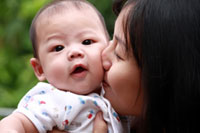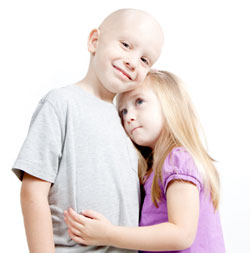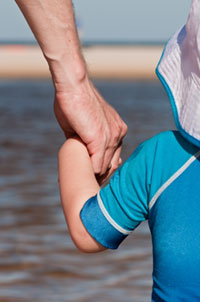Our children, teens and young adults information is currently under review. For cancer information and support, please contact our cancer nurses on 13 11 20. For information relating to paediatric cancer types, treatment and care, see The Royal Children’s Hospital and the Paediatric Integrated Cancer Services (PICS) websites, or speak with your doctor.
The diagnosis can come as a huge shock to everyone in the family. Each person will be trying to deal with their own feelings. These can include shock, fear, anger, sadness and disbelief.
The effects of the child’s cancer often extends to the wider community of school teachers, classmates, neighbours and other people in contact with the child and their family during this illness. Everyone involved needs the right information to support them through this difficult time. This section may provide help with this.
You can read about the feelings and reactions of:
Find out how to help the child with cancer and their siblings:
A child’s feelings and reactions
No matter what age a child is, a cancer diagnosis will have a big effect on them. A child’s age, level of development and personality will determine many of their reactions. However, most children will feel a mix of being anxious, afraid, angry or upset at some stage during their illness.
For most children with cancer, their life changes dramatically. Going through tests, doctor’s appointments and treatment will become part of their daily life. They will have a lot to cope with and it is important they have people close by they can trust and feel loved by at all times.
Although children can show a surprising natural resilience during a serious illness, experts recognise that understanding a child's specific needs, maintaining normal routines, and providing boundaries, comfort and love, are very important to help support this resilience.
For most children their parent/s will be the main source of support during their illness. Children know a parent will be more aware than anyone else about how they cope in unfamiliar situations, what makes them fearful, sad, happy and how to get them to relax during extra stressful moments.
Below we outline some common reactions of children with cancer, by age. Remember though, every child is unique and will react and cope in their own way.
The Cancer Council Australia booklet entitled Talking to children about cancer has a more detailed list of children’s reactions and needs at different ages. Whilst this booklet is aimed at children whose parents have cancer, the information is still relevant to children with cancer.
Babies and infants (0-5 years) 
Children this young worry about the “here and now”. Their main concern will be about being away from parents. They may also be confused and upset about not being able to play and have as much fun as usual.
Very young children and babies may:
- Become very fearful of being separated from their parents – cling more than usual.
- Cry, yell, scream and shout more than usual.
- Become uncooperative during tests and treatment.
- Become angry and upset because their usual daily routine of eating, play and intimacy with parents has been changed.
- Have changes to their sleeping patterns (difficulty getting to sleep or staying asleep.)
- Regress in independence, maturity or toileting habits
- Become withdrawn and not wanting to take part in things they used to enjoy.
Primary school age children (5-12 years)
This age group have gained some independence. They are more aware of what is going on and although some of their reactions will be similar to an infant they may also:
- Need more emotional support than usual from their close family and friends.
- Miss the interaction with school mates and other friends.
- Feel uneasy and frustrated with the disruption to school work and after school activities.
- Display bouts of anger and sadness about their illness and how it is causing loss of school and play time.
- Withdraw from friends and reject school work as a way of protecting themselves from the disappointment of what has happened.
Teens
The diagnosis of cancer in the teenage years can be very confusing and overwhelming. For some, their first reaction will be to push their family away as they try to cope with things alone. However, others will be drawn closer to their parents and siblings and rely on them more than ever. Possible reactions from teenagers can include:
- Being angry and anxious about their body not working as it used to.
- Becoming withdrawn and very low in mood (depressed)
- Pretending things are OK and make a joke of their cancer and its treatment as a way of distracting from what is happening.
- Rebelling against parents, teachers and medical staff making treatment and care more difficult.
- Seeking support from those outside immediate family (e.g. friends, teachers etc) more than usual.
- Feeling embarrassed and upset about what has happened to them especially if treatment has caused side effects which affect the way they look and act (hair loss, mobility problems or weight loss).
For more detailed information read:
You can also call the Cancer Council on 13 11 20.
Adolescents and young adults
A cancer diagnosis during the adolescent & young adult years has different impacts for a young person compared to a younger child or older adult. For young people, adolescence and young adulthood are times of emerging independence physically, psychologically and socially. A cancer diagnosis and its treatment can mean negotiating this complex development as well as coping with a range of emotions which result from the stressors that cancer brings. Particular issues that young people may experience include:
- Loss of independence
- Changes to intimate, peer and family relationships
- Altered physical function, fitness, self-esteem and body image
- Questions about fertility
- Disruption to schooling and education
- Employment challenges and workplace rights
- Financial & practical concerns
For more detailed information read:
Siblings feelings and reactions 
Brothers and sisters of a child with cancer have their own fears. Hospital visits, seeing their brother/sister upset, in pain or acting differently can all be very frightening to a child. They may feel they have lost the once close and fun relationship with their brother or sister. Feeling alone and lost is not uncommon.
Siblings may have feelings of anger and jealousy towards the sibling with cancer. They see them getting a lot of attention. Sadness, guilt that they were the cause of their siblings cancer, and anxiety are other common feelings of siblings. They may also:
- Feel shock and confusion about their sibling’s illness.
- Worry about what is expected of them and how they will cope.
- Pretend they are OK so as not to upset their parents more than they already are.
- Resent the changes their sibling’s illness has brought to their life.
- Get lower marks that usual at school.
- Suffer behavioural changes such as fighting with friends, family and teachers.
For more information and support:
Parent’s feelings and reactions
Understandably, most parents who are told their child has cancer feel completely devastated. At first it can be difficult to come to terms with and try to understand how this will impact the whole family. There may be moments when people can feel numb and don’t believe what is happening. Painful emotions of anger, sadness, guilt, fear and denial are all common and normal feelings of parents who have been told their child has cancer.
It may be reassuring to know that most parents get through these initial reactions and emotions by focussing on what to be done to help support their child and family through this time. Parents play a huge role in how a child copes. A calm, loving, present and reassuring parent can help the child to cope with the treatment.
There is no right or wrong way to feel. Most parents find their emotions go up and down over the course of a child’s treatment. Some days they may feel they are coping and other days may feel completely lost or out of control.
Whilst no-one can fully prepare a parent to cope with their child having cancer we hope the following tips will help.
- Find out all you can about childhood cancer, treatment and care.
- Ask your doctors where to get information on the internet. Some websites are not trustworthy and provide misleading information which can be dangerous and upsetting. For further guidance download the UK Children’s Cancer and Leukaemia Groups (CCLG) leaflet How the internet can help us?
- Do not try to be “brave” and cope alone. Doctors, nurses and all staff at the hospital want to help you. Talk to them, let them know how you feel and ask for help.
- Ask close family and friends for help with home duties (cooking, washing, cleaning, shopping) and caring for your other children. They will want to help but may need guidance as to what to do. Don’t be afraid to tell them!
- Look after yourself. Most parents find this the hardest thing to do, as they focus completely on their sick child’s needs. But it is important to take time out for you and not feel guilty for doing this. You cannot be expected to care for your child if you are not first taking care of yourself.
- Try to talk about your feelings with those you trust. Most people say that when they share their sadness, anger or fear it helps. If you feel you may need some professional counselling ask your GP or the social worker at the hospital for a referral.
- Set up a group email or blog for people who want to know how things are going, or delegate a close friend or family member to give information to the rest of your friendship and family groups. It can be overwhelming to try and inform everyone all the time about what is happening for your child. Be careful about the information you post about your child, he or she may not want their private information in the public arena.
- Take time out to spend with your partner, family and friends. Having a child with cancer can put a lot of strain on your close relationships. It is important to maintain communication both through talking and physical intimacy where possible. You can download the fact sheet Taking care of relationships from the Paediatric Integrated Cancer Service (PICS) website.
- Ask for information and support from the many organisations that help children with cancer and their families.
Further information and support:
- Contact Parents Cancer Connect to talk to another parent who knows what it's like to have a child with cancer.
Other close relatives and friends reactions
Grandparents, aunts, uncles or other close family relatives and friends often have similar feelings to those of the parents of the child with cancer. They may find it difficult to cope with how they feel. Being given accurate and up to date information will help all of these people too.
Grandparents of a child with cancer have not only the concern for their grandchild but also for their son or daughter. Sometimes this ‘double hurt’ may not be appreciated by others. Grandparents who are close to their family may find their role in the family changes when a grand child gets cancer. They can be left feeling quite lost and upset. It is important to try and make them feel part of what is going on. Allow them to take part in the child’s hospital visits and care if possible. This can help everyone.
Family and friends will want to help as much as possible but they may not know what to do. There may be the odd person who reacts in a way you did not expect. Overall though, most people’s intentions will be good. But parents of the sick child may need to ask and guide people to help in the most useful way. Most people will welcome being told what to do in this situation.
For more information call Cancer Council on 13 11 20.
Talking to children about their cancer
 It is only natural to want to protect a child and their siblings about a cancer diagnosis. However, for most children, the regular hospital visits and tests, missing school and other activities will alert them to the fact that something is wrong. Most children pick up on their parent’s feelings. How they react to upsetting news often depends on how the parents are coping with it.
It is only natural to want to protect a child and their siblings about a cancer diagnosis. However, for most children, the regular hospital visits and tests, missing school and other activities will alert them to the fact that something is wrong. Most children pick up on their parent’s feelings. How they react to upsetting news often depends on how the parents are coping with it.
We recommend being open and honest with young people about a cancer diagnosis. Reliable, age-appropriate information can help them understand and cope with changes. However, an honest discussion can be tremendously difficult, particularly when trying to cope with the diagnosis yourself.
If possible, both parents should talk to the child. This way they can support each other. It is important not to overload children with information. Throughout the conversation, clarify that the child understands what is being said. Be sure that all significant people in the child’s life know what has been said. Keep things consistent and honest. It is important not to promise a child anything that adults cannot be sure of.
Letting children know how adults are feeling can will allow them to express their own feelings more easily. Reassure children that whatever they are feeling is normal and that they will be supported throughout.
Download our booklet Talking to Kids about Cancer
For more information and support call Cancer Council on 13 11 20.
Helping your children cope
Most parents worry they might not be able to cope with their emotions during their child’s cancer and its treatment. However, most parents gain strength far beyond what they thought they had and this enables them to them to care for their sick child and their other children.
Parents can support their child by:
- Controlling when and how they express their feelings. Try not to frighten the child with outbursts of strong emotions.
- Focusing on moving forward, finishing treatment and getting back to a more normal life.
- Including other close family and friends in the child’s care. The child may benefit from having someone different by their side from time to time.
- Getting help from the child’s medical team (doctors, nurses, social workers, chaplains, school teachers etc). They are experts in treating children with cancer. They can help parents understand that many of their emotions are normal and manageable.
- Empower your children with knowledge about their cancer and its treatment. Age appropriate information can help lessen fears and allows children to take more control over their situation. This is especially true of older children.
- Look for support from children’s cancer organisations organisations.
Recognising when your child needs extra help
Most children with cancer and their siblings will go through a range of emotions. Overall, they usually manage to find a way to cope, however, there may be times when your child needs extra support. Children of all ages will usually look to their parents for that extra support however; there may be times when they are too anxious or overwhelmed to know how to ask for it. Parents need to be able to recognise the signs if their child has a more serious problem and needs to talk to a health professional.
A child usually needs extra help and support if they:
- Feel sad all the time and cry a lot
- Cannot concentrate
- Cannot be comforted or reassured
- Show less interest in their school work, hobbies and friendships
- Have severe mood swings
- Feel irritable, upset and angry often
- Talk about hurting themselves of thinking of suicide
- Have a change in behaviour or behave differently than usual
- Have weight loss/gain/appetite changes not related to the cancer and its treatment
- Suffer low energy/fatigue not related to the cancer and its treatment
- Have trouble sleeping that goes on for more than a week or two
For more information:
Expert content reviewers:
Cancer Council Victoria with assistance from The Paediatric Integrated Cancer Service (PICS), parents and staff from the Oncology units at both The Royal Children’s Hospital, Melbourne & Monash Children's, Monash Health, Melbourne and ONTrac, Peter Mac Victorian Adolescent and Young Adult (AYA) Cancer Service.